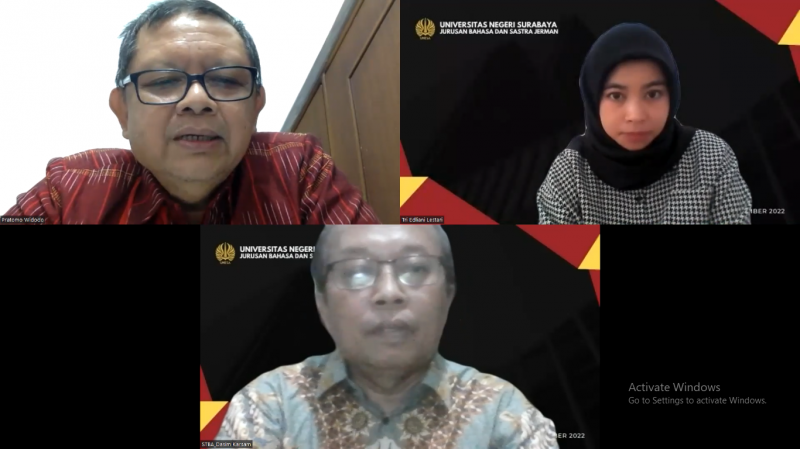
www.unesa.ac.id
Unesa.ac.id, SURABAYA-The Department of German Language and Literature, Faculty of Languages and Arts (FBS), Surabaya State University (UNESA) held a national seminar with the theme 'The Importance of Foreign Language Competence for the World of Work and Industry in the Digital 4.0 Era' on Saturday, 3 December 2022. This activity was attended Prof. Dr. Pratomo Widodo, M.Pd., Professor of German Language and Literature Education, Yogyakarta State University and Dr. Doni Jaya, M.Hum lecturer at the Department of Linguistics, UI.
Prof. Dr. Drs. Pratomo Widodo, M.Pd., said there were a number of challenges in learning a language, including cultural challenges. This can be answered with culture intelligence, one of which focuses on intercultural communication. In the world of business and industry or DUDI, the 21st skills that must be mastered are critical thinking, communication, technology literacy, creativity, information literacy, flexibility, collaboration, and media literacy.
When communicating with other people from different cultures, he continued, it will affect communication. This will be the basis if we work in Germany or German companies spread across the archipelago. In learning a language, there are two important aspects to consider, namely aptitude and attitude. "Most of the motivation of people learning languages is to pursue achievement rather than attitude or attitude assessment," he said.
In learning a language, the weight of learning between learning and equitation must be balanced. Learning is learning that is done consciously. While equitation is learning that is done unconsciously. It is precisely what is done unconsciously that forms fluency during the learning process.
Simple steps to consistently learn a foreign language start from routine and strong commitment. "The more people meet various people with different cultural backgrounds, the more pious a person will be or be able to appreciate differences."
Dr. Doni Jaya, M.Hum, explained several tips for becoming a professional translator, including starting to make non-technical texts such as brochures; letter; study material; news, practice diligently translating texts you like, work with a translation agency to enrich your experience, join a professional association (HPI), actively network with colleagues in the profession, attend courses and seminars related to translation, make your own specialization such as specializing in literary texts; corporate specialization; journalism specialization, and so on.
Doni also explained that there are many benefits to being a translator, including being able to enrich knowledge, sworn and certified translators are highly sought after and paid handsomely. Foreign language translators are rare and paid more than other, more common languages. Apart from that, as an interpreter you get bonuses for traveling, big wages, meeting important people, and so on.
FBS Dean Dr. Trisakti, M.Sc. We hope that German Language and Literature students will be passionate about being competent in foreign languages and be able to upgrade their language skills better after attending a national seminar. The seminar was attended by the leadership of the Faculty of Languages and Arts, the ranks of the German Language and Literature Department, Dr. Dwi Imroatu Julaikah, S.Pd., M.Pd., and an environmental student at Surabaya State University. [UNESA PR]
***
Author: Fionna
Editor: @zam Alasiah*
Photo: UNESA Public Relations Team Documentation
Share It On:






